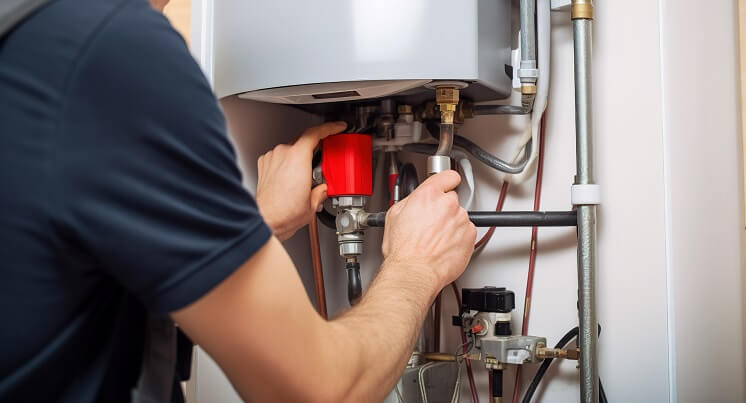Mastering The Basics Of Water Heater Issues
Mastering The Basics Of Water Heater Issues
Blog Article
They are making a few good points on the subject of Water Heater Repair and Troubleshooting overall in this great article underneath.

Envision starting your day without your regular hot shower. That already establishes a poor tone for the remainder of your day.
Every home requires a reputable hot water heater, but just a few know exactly how to take care of one. One simple method to maintain your water heater in leading form is to check for faults consistently and fix them as quickly as they appear.
Remember to turn off your water heater prior to smelling about for faults. These are the water heater mistakes you are probably to come across.
Water too hot or as well chilly
Every water heater has a thermostat that establishes exactly how warm the water gets. If the water entering your home is also hot despite establishing a hassle-free maximum temperature level, your thermostat may be faulty.
On the other hand, also cold water might be due to a failed thermostat, a busted circuit, or improper gas flow. For example, if you utilize a gas water heater with a damaged pilot light, you would get cold water, even if the thermostat is in perfect condition. For electrical heating systems, a blown fuse might be the culprit.
Not enough warm water
Hot water heater been available in lots of sizes, depending on your warm water demands. If you run out of warm water before every person has actually had a bath, your hot water heater is as well tiny for your family size. You must think about mounting a larger hot water heater storage tank or opting for a tankless water heater, which occupies less room and is a lot more resilient.
Weird noises
There are at least five sort of noises you can learn through a water heater, but one of the most usual interpretation is that it's time for the water heater to retire.
First off, you should recognize with the typical appears a hot water heater makes. An electric heating unit might sound different from a gas-powered one.
Standing out or banging noises typically indicate there is a slab of sediment in your tanks, as well as it's time to cleanse it out. On the other hand, whistling or hissing noises may merely be your valves allowing some stress off.
Water leaks
Leakages can come from pipes, water connections, shutoffs, or in the worst-case circumstance, the container itself. Gradually, water will corrode the container, as well as find its escape. If this happens, you require to replace your hot water heater as soon as possible.
However, prior to your modification your entire storage tank, make sure that all pipelines are in area and that each valve works flawlessly. If you still require aid recognizing a leak, call your plumber.
Rust-colored water
Rust-colored water suggests one of your hot water heater parts is corroded. Maybe the anode pole, or the storage tank itself. Your plumber will certainly be able to identify which it is.
Warm water
Despite exactly how high you established the thermostat, you will not get any warm water out of a heater well past its prime. A hot water heater's efficiency might lower with time.
You will certainly likewise get lukewarm water if your pipelines have a cross connection. This means that when you activate a tap, hot water from the heating unit flows in alongside regular, cold water. A cross link is easy to place. If your warm water faucets still run after shutting the water heater shutoffs, you have a cross connection.
Discoloured Water
Rust is a significant source of filthy or discoloured water. Corrosion within the water container or a stopping working anode rod can trigger this discolouration. The anode pole secures the tank from rusting on the inside and also must be checked yearly. Without a pole or an appropriately operating anode pole, the hot water promptly corrodes inside the container. Call a professional water heater service technician to determine if replacing the anode rod will certainly deal with the trouble; otherwise, change your hot water heater.
Verdict
Preferably, your water heater can last ten years before you need a change. Nevertheless, after the 10-year mark, you may experience any of these mistakes extra frequently. Now, you must include a new hot water heater to your budget plan.
How To Troubleshoot 3 Common Water Heater Problems in Twin Cities
The Water Heater Is Leaking
A leaky cold water inlet valve A loose pipe fitting A leaky temperature and pressure relief valve A corroded anode rod A cracked tank Turn Off Your Water Heater:
Shut off your gas water heater by turning the gas valve on the unit to the “OFF” position. Shut off your electric water by switching its power off at your electrical panel. Look for a two-pole breaker labeled “water heater” and turn it to the “OFF” position. Move the ball valve connected to the water heater to be perpendicular to the piping at a 90° angle. Look for the Leak:
Depending on whether the water is coming from the tank's top or bottom, you’ll want to look for the leak in different locations.
If the leak comes from the top of the tank, carefully look for water escaping from the cold water inlet valve or loose pipe fittings. Rusted hot and cold water valves can have loose connections with the tank, with water leaking out of them.
https://mspplumbingheatingair.com/blog/how-to-troubleshoot-3-common-water-heater-problems
As a serious reader about Water Heater Repair and Troubleshooting, I imagined sharing that excerpt was mandatory. Liked our blog entry? Please share it. Let others locate it. I praise you for your time. Visit again soon.
Trusted plumbing solutions at hand. Report this page